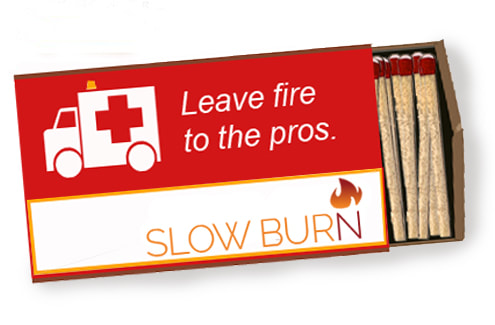 ...or listen here. ...or listen here. The famous local radio host (who is obviously pretending to be live, since he's not on the air for another three hours) says something like this: "You hear a lot of mortgage advertising here on [the name of this radio station], but one I've recommended for years is National Loans. [Not their real name.] They get you the lowest interest rates available. And the best loan for your situation. They have all kinds of loans. Right now, they have 3.875 percent on a 30-year fixed. And if you want to pull out some cash out for home improvements, they can do that, too." Blah blah blah blah. I don't even remember if there was a tagline. There sure wasn't any effort at focus. Low rates. All loans. Cash out re-fi. It's an exercise in throwing a handful of stuff at the listener and hoping some of it sticks. But it won't. Because nothing is sticky. It's calculated to make the listener glaze over and start thinking, "Do I need to cut my toenails?" THERE MAY BE NO OTHER CATEGORY THAT BETTER DEMONSTRATES HOW NOT TO ADVERTISE The word "Mortgage" is French for "death note." And that is a really apt metaphorfor much of the category's advertising. It's so bad, I once wrote a book about it. This was back in 2004. It set a first-day sales record for Wizard Academy Press. The book explained how bad the advertising is, and how to make it better. Routinely, I'd get emails from advertisers who'd read the book. They'd say, "I loved your book! Here's my new commercial!" And I'd listen to it or read the script, and I'd think, "OK, seems the only part you read was how not to do it." Why don't these guys pay attention? It's not complicated. The book was called Million-Dollar Mortgage Radio. YES, IT SOUNDS REALLY BORING It's not. It's also mercifully short. And as one reviewer said, "If I only owned one book on Radio it would be this one. I'm a little bummed the title says Mortgage Radio since truly this is a radio copywriter's secret weapon...no matter what the product." Thanks, Mom! But if what we do here in the screed is learn from other people's mistakes, the mortgage category is a brilliant learning tool. Let's take the message mentioned at the beginning of the screed. Let's forget the category for a second. What advertiser on a radio station wants to hear himself lumped in with all the other advertisers in the category that aren't endorsed by this host? "THANKS GIVING US YOUR MONEY, BUT YOU'RE NOT AS GOOD AS THIS GUY!" There's a way to win friends and influence people. Now, the jab at the other advertisers aside, here's the problem with advertising, "Low rates!" It's the price of entry. Nobody wants to pay high rates. What customer wants to pay more? None. You also can't throw a series of bullet points at a customer and expect it to mean anything. You. Need. Focus. You need to pick one thing to talk about. You need to make it matter to one person. DO THAT, AND ONE PERSON WILL CARE And then, that one person will call. Along with a whole bunch of other individuals just like him or her. This works. That simple. But, I was thinking, Am I being too hard on the category? Should I cut them some slack? So I started by looking at that advertiser's website. No, I'm not being too hard. "Welcome to National Loans, one of the leading mortgage companies in the city." How's that for a meaningful introduction? "IT'S ALL ABOUT US AND NOT ABOUT YOU!" The site's copy was blossoming with words and phrases listed in the Little Boy's Big Book Of Hackneyed Copywriting. "Promise." "Comprehensive communication." "Lowest rates ." "Level of service." "In business for XX years." "Better Business Bureau A+ rating." "The best loan program for every individual situation." "You won't find better rates or lower costs anywhere else." "Trained and experienced." AND JUST FOR FUN? The copy shifts the narrative voice. It starts by talking about "You," as a customer, then suddenly starts talking about customers as "Them." And here's the kicker. Buried way deep in the copy that doesn't demand to read, there's a feature that actually makes sense. It could have been used to inform a brand direction. It could have made the prospect feel good about the purchase. It could have made this company matter. And it was hidden down in the depths of banal words and lazy phrasing. BUT STILL: AM I BEING TOO HARD ON THE CATEGORY? So I continued searching the category. National Loans (not their real name), meet State Loans (also not their real name). But the names might as well be real. They're both close enough. "Begin Your Dream of Home Ownership." "Trust. Experience. Knowledge. Commitment." "All loan programs available." My favorite: "Do you qualify? Find out now in 60 seconds." Is that now? Or in a minute from now? "Buying a home?" "Refinancing?" "WE DO EVERYTHING AND WE STAND FOR NOTHING! WELCOME!" I kept digging. There is a bevy of brand names so generic, they could be interchangeable and they make the prospect feel nothing useful. There's endless banal phrasing. "Setting a higher standard." "Putting customers first." "Get started on your journey to home ownership." "Becoming a Homeowner In This State Has Never Been Easier." "One of the state's premier mortgage lenders." With the name of the state spelled wrong. Nice. Here's my favorite, which does actually take a stab at differentiation and giving the prospect a reason to care--but in doing so, shoots itself in the foot: "We are a 100% referral-based business. 100% of our business comes from folks like you." Really? THEN WHY ARE YOU ADVERTISING? The copy goes on to proclaim they don't need any of the elements of good branding. They actually profess to be immune to things that help the prospect recall them and feel good about the business. I dug through pages of Google search results and plowed through paragraphs of trite and trivial copywriting hoping to find something that matters. And I did. Sort of. It wasn't brilliant. BUT IT WAS AN HONEST AND THOUGHTFUL EFFORT TO MATTER Many of these websites have generic videos offering words, and the company names are tacked on. But this guy (whose company name was not grand and stately, but small and folksy) brands himself as "A better way to mortgage." And down the page is a video, not fancy, not slick, just very real and honest, in which the guy explains "Four simple steps to your best loan." And the website reinforces that simplicity. Yeah, it has some typical mortgage website stuff. Loan calculator. Rates. But ultimately, it's very simple, very clear, and wants you to have "A better way to mortgage" through four simple steps. IT'S JUST NOT THAT HARD Stand for something. Matter to your customer. Make it simple. Be surprising. Don't tell me you're honest and you put the customer first. Show me. Demonstrate your worth. Define your core customer, and deliver one coherent message that makes the customer feel one right thing about your business. We can all do this. The size of the business doesn't matter. Yes, mortgage advertising has rules and regs that most of the rest of us don't. They also have a much higher-value customer than most of us do. They can afford to hire advertising people who Get It. If you can't or won't do it yourself, hire a real pro. Not the guy with the lowest fees. Someone with obvious proficiency. A real pro understands how to tap into the advertiser's psyche, the customer's psyche, and bring them together in a place where magic happens and the phone rings. That's today's soapbox. And please, do not go buy Million-Dollar Mortgage Radio.Check it out on Amazon, and if you really think you want it, I will send you a hard copy for free. Just send an email to submissions at slow burn marketing dot com. This offer is good until May 15, 2017. Which you can remember because it's also everyone's favorite holiday, Relive Your Past By Listening To The First Music You Ever bought No Matter What It Was No Excuses Day. Really . As always, Blaine Parker Your Lean, Mean Creative Director in Park City
0 Comments
 YES, THERE ARE STILL BURNING QUESTIONS FROM LAST YEAR Believe it or not. There are faithful readers out there who sent their burning questions at the end of Q4. They're still waiting for your relentless scribe to answer them here at the end of Q1. Since I've received no Constant Contact unsubscribe notices bearing their names, I assume they're still reading. And today's question comes from a man whom I've known professionally for many years. When we first began our professional association years ago, he was a Copywriter & Production Manager. Today, he is a Business Manager. THAT LATTER TITLE ALONE WOULD TERRIFY MOST COPYWRITERS Which leads one to believe, this man is destined for bigger things than mere copywriting. He may even be destined to be a boss of copywriters. During my career, I was occasionally offered gigs that strayed away from grappling with the blank page to managing people and details and hardware. I've been a coordinator, manager and producer. And I was pretty good at it. But NEVER would I ever want to be the boss of copywriters. That's not a job that requires herding cats. It requires herding rainbow unicorn cats with a bad attitude. HE'S A BETTER MAN THAN I AM And his burning question stems from his need to manage people. His job description requires him to "boost morale in many ways." Which seems to feed right into his query: "How 'bout tips on motivation" when it comes the sales staff writing radio commercials? (Fear not: we will make this apply to you, too.) This is a very, very dangerous question to be asking me. The first thing I'll say is that the sales staff shouldn't be writing the commercials. THE SALES STAFF SHOULD BE OUT SELLING AIR TIME AND MANAGING CLIENTS No account rep ever said, "Boy, I want to write me some advertising!" They say things like, "I want to go out there, wrangle clients and make a pile of money!" Indeed, some account reps don't fit this paradigm. But by and large, sales people are extroverts motivated by going out and making money. That's at odds with the introverted, intellectual task of writing scripts. That's not to say they don't want to do it, or can't do it. Some do and some will. BUT THERE'S NO EARTHLY REASON A RADIO STATION DOESN'T HAVE A COPYWRITER ON STAFF Except that they're cheap. Many corporate bean counters can figure out some way to justify eliminating a fulltime copywriter. I know because I've seen it happen. National award-winning, ROI-producing, failure-reversing, published copywriter working for half the going salary of his position gets canned because a bean counter up the chain doesn't understand how to measure the results that keeps advertiser on the air--and it's the advertisers who keep the lights on. Radio is like any business (not yours, we hope) that has turned sad because of a poverty mentality and inability to understand the value of soft assets. But I digress. The sales staff are required to write their own scripts. How does a business management guy keep them motivated? How does he inspire them to be creative, and write things that are better than the standard announcer-driven rip & read yawn fest for "all your fill in the blank needs"? And how do I make it relevant to you, the non-copywriter? I HAVE NO IDEA Because trying to motivate anyone to do something he has no interest in doing is a really bad idea. However, that answer doesn't help anyone. It will not earn me my pay on this fine Tuesday morning in early spring. So all I can do is offer a couple of tips that work for me personally, and hope they can be adapted in a way that piques the interest of an aggressive, extraverted, money-motivated sharpie in a designer suit who really has no interest in sitting down and negotiating with himself over single words and comma placements. So, the first place I always go when looking for motivation? THE AWARD-WINNING COMMERCIALS Frequently, I sit and listen to the commercials that won the big awards, especially the Radio Mercury Awards. In fact, early in my career, the idea of winning a Mercury was an huge motivator for me. This is the Oscars of radio advertising. There are also huge cash prizes. They are not easy to win. In the main, Mercury-winning advertising is really well executed from concept to completion. Sadly, while they're always creative, they're not always good advertising. Whoever is using them as motivation needs to understand the difference. LOOKING AT OR LISTENING TO INSPIRING WORK IS A GREAT MOTIVATOR It doesn't matter what business you're in. If you see work that raises the bar for your industry, using it as a yardstick for yourself can improve your own work. Whether you're writing radio, building a website or opening a retail store, look at the someone who has done it really well. Look at the success stories. Then say, "How can I make that better?" That doesn't mean copying it and then changing the color from green to pink. That's lame. INSTEAD, FIND A PRODUCT THAT MAKES YOUR HEART BEAT JUST A LITTLE FASTER Find a version of what you do (or want to do) that makes you envious. Then say, "OK, how do we improve on that?" Or, "What can I take from this to apply in my own work?" In writing, it can be as simple as hearing a ballsy conceit in a radio commercial, like insulting the advertiser for a big payoff, and thinking, "Wow, I want to be that edgy." The man who submitted the query had suggested that maybe it was about getting a rep to write a two-voice spot instead of a one-voice spot. COUNTING THE NUMBER OF VOICES MISSES THE POINT What are you doing with the voices that are in the commercial to begin with? Are they interesting? Are they engaging? Are they saying something that makes the listener say, "Tell me more!" That can happen with a single voice. And those criteria can be applied anywhere, no matter what you're creating. Is what you're doing interesting, engaging and leading the horse to water? Say you're opening a casual restaurant. You like the interior decoration motif of Chipotle. Does that mean you should copy Chipotle? OF COURSE NOT! THAT'S LAZY THINKING! But it should lead you to ask, "What have they done, and what can I do that's similar but different?" Maybe you think, "I know, my restaurant is going to look like the original Banana Republic! We're going with a military surplus motif, and all of our meals will be served in old tin mess kits! And the place will look like the inside of a M*A*S*H tent." Yes, it sounds really stupid. But maybe it would work. The point is, you're looking at the creative topology of something that inspires you (Chipotle) and looking for a different conceit that is equally unique and makes the customer feel something. A restaurant experience is theater. What play do you want your customer to feel like they're in? OKAY, MAYBE WE'RE GETTING A LITTLE FAR AFIELD HERE Now I'm going to have to start saying things like, "No, I didn't mean it's literally a theatrical experience. That's a metaphor." Experience has taught me that anything that isn't direct, literal and simple really throws someone who is direct, literal and simple. Like, a fellow copywriter once came to me for advice. I said that it's useful to look for inspiration in poetry you enjoy, and handed the writer a book of verse by Andrei Codrescu, a Romanian immigrant who's a former Mac Curdy Distinguished Professor of English at Louisiana State University at Baton Rouge and an NPR commentator and very funny. That copywriter never, ever asked me for any advice ever again. Some people have a very difficult time coloring outside the lines they've defined for themselves. And frequently, those lines are chokingly narrow. THE OTHER WAY TO LOOK FOR MOTIVATION REQUIRES A NUT When I was working in Los Angeles radio, there was a production director who was a lunatic. If I had a germ of an idea that needed fleshing out, I would go to him. I'd say, "We have a new client with a swimming pool cleaning service. I'm thinking a story about a homeowner who has a chronic problem with alligators in the pool." It wasn't even necessary to finish the thought before there were a dozen different ideas about the alligator problem and how the advertiser solves it, ranging from big steel nets on cranes to hand grenades and tactical nuclear weapons. Did that mean I ended up writing a commercial about a pool service that provided a tactical nuclear weapon service to remove alligators from the pool? No. BUT THE FEW MINUTES SPENT WITH THE NUT PUSHED THE STORY WAY OUTSIDE THE LINES It gave me new ideas that completely changed the way I was approaching the creative problem. And it often inspired a new and reasonable solution that made for a better advertisement. And again, this method isn't limited to radio advertising. Whenever you're looking for new inspiration for a creative challenge, it can help to talk to someone who isn't immersed in the challenge and can bring crazy outside ideas into the equation. And it can be a surprising motivator for doing better work. It sparks excitement and propels you to create. Whether any of this will be of use to our business manager, I have no idea. But across the board, no matter what business you're in, it helps to have outside inspirations, inside inspirations, and a willingness to stray outside the lines to create better work. Just make sure that ultimately, you're creating the new work for the person at the other end of the communication. Because if all you're doing is entertaining yourself, you're doing a disservice to both yourself, your client (if there is one), and whoever is supposed to be receiving the message. |
AuthorBlaine Parker is prone to ranting about any and all things related to brand. In many ways, he is a professional curmudgeon. While there is no known vaccine for this, the condition is also not contagious. Unless you choose it to be so. Archives
February 2022
Categories
All
|
|
© Copyright 2020 Slow Burn Marketing LLC |

 RSS Feed
RSS Feed

